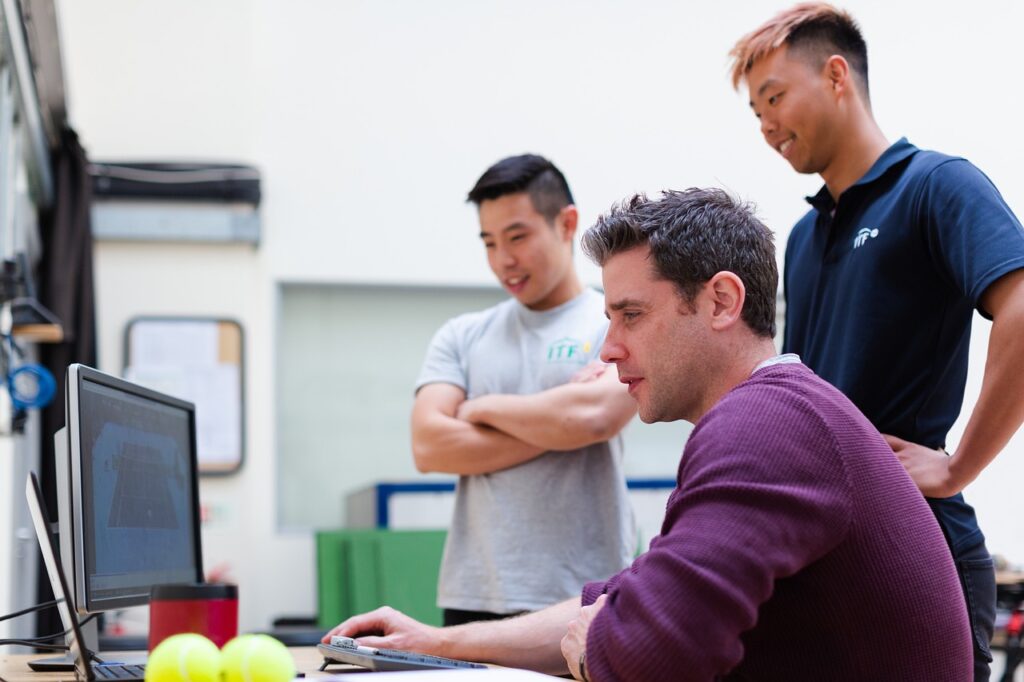Sports science is a multidisciplinary field that applies scientific principles to improve athletic performance, prevent injuries, and promote overall wellness. It encompasses various disciplines, such as physiology, biomechanics, psychology, nutrition, and sports management. As the importance of sports science continues to grow in today’s world, it is crucial for individuals interested in pursuing a career in this field to understand the different sports science degrees and their benefits. This guide aims to provide an in-depth understanding of sports science degrees, helping you make informed decisions about your education and career path.
Schools Offering Sports Science Degrees

Online Sports Science Degrees from American Public University
BS in Sports and Health Sciences; MS in Sports and Health Sciences

Sports Science Degrees from Texas A&M
BS in Kinesiology: Concentration in Exercise and Sports Science

Sports Science Degrees from Maryville University
Online Bachelor’s in Exercise Science

Sports Science Degrees from Franklin University
Online B.S. in Exercise Science
Overview of Sports Science Degrees
Sports science degrees offer a comprehensive education in various disciplines, enabling students to gain expertise in physiology, biomechanics, psychology, nutrition, and sports management. These degrees are designed to provide a strong foundation for careers in the sports and fitness industries, as well as related fields such as healthcare and education.
The duration of sports science degrees varies depending on the level of study. Students can typically complete their degree in 3 to 4 years at the undergraduate level, while a master’s degree in sports science may take 1 to 2 years to complete. This allows students to gain the necessary knowledge and skills to excel in their chosen career path, while also offering the flexibility to pursue further education or professional development opportunities.
Entry Requirements for Sports Science Degrees
Before enrolling in a sports science degree program, it is essential for aspiring students to fulfill certain entry requirements. A strong aptitude in sciences is crucial, as sports science involves the application of scientific principles to various aspects of sports and exercise. Moreover, a keen interest in sports will help students stay motivated and engaged in their studies, allowing them to excel in their chosen field.
Educational qualifications and prerequisites for sports science degrees may vary depending on the institution and the level of study. Generally, applicants must possess a high school diploma or equivalent, with a strong background in subjects such as biology, chemistry, physics, and mathematics. Some programs may also require students to demonstrate their physical fitness or sports involvement. It is advisable for prospective students to research the specific entry requirements of their desired program and institution to ensure they meet the necessary criteria.

Types of Sports Science Programs
Certificate programs
Certificate programs in sports science provide a focused introduction to the field, typically lasting several months to a year. These programs teach students how to apply physical and psychological theory to sports, equipping them with foundational knowledge and skills. Certificate programs may be suitable for individuals seeking to enhance their understanding of specific areas within sports science or those looking to transition into a sports-related career.
Associate degrees
Associate degrees in sports science generally span two years and offer a broad introduction to the field. These programs may also focus on specific sectors, such as exercise science or fitness. Associate degree holders can pursue entry-level positions in sports science or continue their education through a bachelor’s degree program.
Bachelor’s degrees
Bachelor’s degrees in sports science typically require four years of study and provide a comprehensive education in the field. These programs emphasize physiology, medical science, nutrition, and health, preparing students for a wide range of sports science careers. A bachelor’s degree is often required for most professional roles within the industry.
Master’s degrees and specializations
Master’s degree programs in sports science usually last one or two years and offer students the opportunity to specialize in a particular area of interest. Common specializations include sports management, sports physiotherapy, physical and sports education, sports psychology, and sports nutrition. These advanced degrees allow graduates to pursue specialized roles and advance their careers within the sports science field
Choosing the Right Sports Science Degree Program
Selecting the appropriate sports science degree program is crucial to achieving your career goals and ensuring a fulfilling educational experience. Some factors to consider when making this decision include your personal interests, preferred learning format, career goals, and the insights gained from shadowing sports healthcare professionals.
Aligning your sports science degree with your personal interests will ensure that you remain engaged and passionate about your studies. Choose a program that focuses on the aspects of sports science that you find most intriguing, whether it be sports psychology, nutrition, or management.
Consider your preferred learning format, whether it be on-campus or online. While on-campus programs offer a traditional learning experience and opportunities for hands-on training, online programs provide flexibility for those with work or family commitments.
Identify your career goals and choose a sports science degree program that will help you achieve them. For instance, if you aspire to become a sports nutritionist, opt for a program with a strong emphasis on nutrition and dietetics.
Shadowing sports healthcare professionals can provide valuable insights into the various specializations within sports science. This experience can help you make an informed decision about which aspect of sports science to study, ensuring that you select a degree program that aligns with your long-term career objectives.

Tips for researching and comparing different programs
When researching and comparing sports science degree programs, consider the following tips:
- Explore the curriculum and course offerings to ensure they align with your interests and career goals.
- Review the faculty’s expertise and research interests to ensure they align with your desired area of focus.
- Investigate the program’s reputation, accreditation, and graduate success rates, including job placement and salary data.
- Consider the availability of internships, research opportunities, and hands-on experiences that can enhance your learning and professional development.
- Visit the campus or participate in virtual information sessions to get a feel for the learning environment and facilities.
- Speak with current students or alumni to gain insights into their experiences and satisfaction with the program.
Career Opportunities with a Degree in Sports Science
Graduates with sports science degrees have diverse career opportunities, depending on their interests, skills, and chosen specializations. Some potential career paths include:
Athletic trainers
Athletic trainers work with athletes to prevent, diagnose, and treat sports-related injuries. They may collaborate with physicians and other healthcare professionals to develop and implement comprehensive care plans for injured athletes.
Personal trainers
Personal trainers design and implement customized fitness programs for clients, helping them achieve their health and fitness goals. They instruct clients on proper exercise techniques, monitor progress, and provide motivation and support.
Physical therapists
Physical therapists help patients recover from injuries or manage chronic conditions through the use of targeted exercise, manual therapy, and other treatments. They may work with athletes to rehabilitate sports-related injuries or help individuals regain mobility and function after illness or surgery.
Strength and conditioning coaches
Strength and conditioning coaches develop and implement training programs to enhance athletes’ strength, speed, power, and endurance. They work with teams or individual athletes to optimize performance and minimize the risk of injury.
Sports medicine physicians
Sports medicine physicians specialize in diagnosing, treating, and preventing sports-related injuries and medical conditions. They may work with athletes and teams to manage injuries and promote overall health and well-being.
Dietitians and nutritionists
Dietitians and nutritionists develop personalized nutrition plans for athletes, taking into account factors such as energy expenditure, training demands, and individual goals. They help athletes optimize performance, recover effectively, and maintain overall health.
Exercise physiologists
Exercise physiologists study the body’s response to exercise and physical activity, using their expertise to develop effective training programs and strategies for improving athletic performance.
Additional roles in fitness centers, gyms, and educational institutions
Graduates with sports science degrees may also find employment in fitness centers and gyms as fitness instructors, sports coaches, or facility managers. Additionally, they may pursue roles in educational institutions as physical education teachers or sports program coordinators.

Certification in Sports Science and Sports Medicine
Obtaining certification in sports science and sports medicine is essential for professionals in these fields, as it demonstrates their competence, expertise, and commitment to staying current with industry best practices. Numerous certifications are available, each focusing on specific aspects of sports science and sports medicine.
Some popular certifications include the Board of Certification (BOC) for athletic trainers, the American College of Sports Medicine Certified Personal Trainer (cPT), and the Certified Strength and Conditioning Specialist (CSCS). These certifications require candidates to meet specific educational and professional experience requirements, as well as pass a comprehensive examination to demonstrate their proficiency in the respective discipline.
Various associations and certification bodies are responsible for administering these certifications and ensuring that professionals maintain their skills and knowledge through continuing education. Some of the most prominent organizations in this field include the American College of Sports Medicine (ACSM) and the National Athletic Trainers’ Association (NATA). By pursuing and maintaining certification, sports science and sports medicine professionals enhance their credibility, expand their career opportunities, and contribute to the overall advancement of their fields.
Gaining Relevant Work Experience
The value of work experience alongside a sports science degree
Acquiring relevant work experience alongside a sports science degree can significantly enhance a graduate’s employability and career prospects. Hands-on experience allows students to apply their theoretical knowledge in real-world settings, develop practical skills, and build a professional network within the industry. Furthermore, work experience can help students identify their specific interests and career goals within the sports science field.
Opportunities for shadowing sports healthcare professionals
Shadowing sports healthcare professionals, such as athletic trainers, sports medicine physicians, or physical therapists, can provide valuable insights into the day-to-day responsibilities and challenges of various roles within the industry. This experience can help students decide which aspect of sports science they want to pursue and determine the best educational path to achieve their career goals.
Internships and part-time jobs in the sports science field
Internships and part-time jobs in the sports science field offer students the opportunity to gain practical experience and develop essential skills while still completing their degree. Many universities, sports organizations, and healthcare facilities offer internships or part-time positions for students studying sports science. These opportunities can provide valuable networking, mentorship, and career development experiences, ultimately enhancing a graduate’s career prospects and success in the sports science industry.
Unlock Your Sports Science Potential
This comprehensive guide has explored the importance and potential of sports science degrees, examining entry requirements, types of degrees, career opportunities, and professional certifications. Pursuing a degree in sports science can open doors to a fulfilling and lucrative career in a growing industry. If you’re considering a sports science degree, take the time to research and compare programs, keeping in mind your personal interests, preferred learning format, and long-term career goals.
For more guidance and support, visit Pathways to Advancement, an online education solution designed for adult learners and non-traditional students seeking affordable and relevant education options to advance their careers. Discover valuable resources, expert advice, and personalized education pathways that align with your goals and unlock your potential in sports science.
